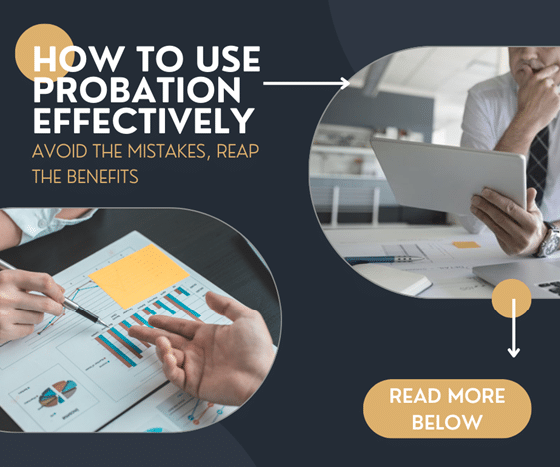
Using the Probation Period Effectively: Traps and Pitfalls
When you hire a new employee, it’s common practice to initiate their tenure with a probationary period. This trial phase allows you to evaluate the employee’s fit and performance within their role. While the idea of extending this probationary phase might seem beneficial for a more thorough assessment, it’s crucial to understand the legal implications under the Fair Work Act to avoid potential claims of unfair dismissal.
This article will delve into the considerations and requirements for legally extending an employee’s probationary period, aiming to safeguard your business from any legal challenges.
Probationary periods typically mark the beginning of a permanent full-time or part-time employment contract, offering a straightforward pathway should you decide the employee isn’t the right fit for the position.
While employers generally have the discretion to set the probation period’s duration, certain awards or agreements may dictate otherwise. The notion of extending this period can be appealing, providing additional time to assess an employee’s suitability. However, several critical factors must be considered before making such a decision.
Unfair Dismissal Risks
Extending a probationary period carries the risk of unfair dismissal claims if the extension allows the employee to surpass the Fair Work Act’s minimum employment period. According to the Act, employees are shielded from making unfair dismissal claims if they have not completed:
• One year of employment in a small business with fewer than 15 employees; or
• Six months in a larger business with 15 or more employees.
Although probationary periods often last only three months, extending this duration could inadvertently qualify an employee to lodge an unfair dismissal claim, assuming they then meet the minimum employment period stipulated by the Act due to the extension.
Maintaining Employee Entitlements
It’s imperative to remember that extending a probationary period does not alter an employee’s entitlements. Probationary employees should continue receiving the same benefits as their non-probationary counterparts, including the accumulation of paid leave.
Should you decide to terminate an employee before the completion of their extended probation, they are entitled to a payout of any accrued leave in their final remuneration. Additionally, it’s essential to provide written notice of termination, clearly outlining the notice period and the termination date. In summary, while extending a probationary period offers more time to evaluate an employee’s fit within your company, it’s critical to navigate this process with a keen awareness of the Fair Work Act’s provisions. Ensuring compliance not only protects your business from potential legal challenges but also upholds fair and respectful treatment of employees during their probationary tenure





